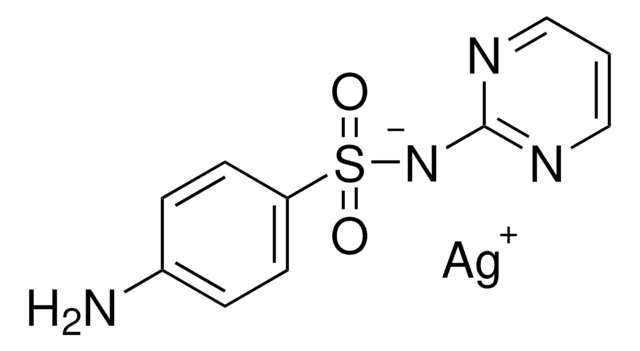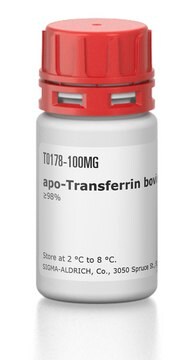推荐产品
生物源
mouse
品質等級
重組細胞
expressed in NSO cells
化驗
>97% (SDS-PAGE)
形狀
lyophilized powder
效力
2.1 ng/mL EC50
分子量
~75 kDa by SDS-PAGE (as a result of glycosylation)
predicted mol wt 35 kDa
包裝
pkg of 5 μg
儲存條件
avoid repeated freeze/thaw cycles
技術
cell culture | mammalian: suitable
雜質
endotoxin, tested
UniProt登錄號
儲存溫度
−20°C
基因資訊
mouse ... Thpo(21832)
應用
Thrombopoietin from mouse can be used in a genetic screening test for examining the role of somatic activating mutations in EPOR, MPL, or GCSFR genes in activating myeloproliferative disorders (MPD) in JAK2V617F-negative MPD patients.
生化/生理作用
Thrombopoeitin (TPO), also known as the ligand for the c-mpl proto-oncogene (Mpl-L) and as megakaryocyte colony stimulating factor (Meg-CSF), is a primary regulatory factor for megakaryocytopoiesis and thrombopoiesis. Produced mainly by hepatocytes but also by kidney cells, TPO is a humoral glycoprotein that stimulates growth and maturation of megakaryocytes and megakaryocytic colonies from bone marrow cultures. TPO binds and activates an 68-78 kDa glycoprotein receptor belonging to the GH family of cytokine receptors, a family that includes receptors to growth hormone (GH), erythropoietin (EPO) and prolactin (PRL). Like GH and EPO, TPO may bind to its receptor at two distinct sites, initiating receptor dimerization and activation. Analysis of mRNA indicates also the existence of a novel truncated and potentially soluble form of TPO receptor. The viral oncogene v-mlp of the myeloproliferative leukemia virus (MPLV) contains the gene sequence for the entire cytoplasmic and transmembrane domains and a portion of the extracellular domain of c-mlp (TPO receptor). TPO receptors are found on megakaryocytes and their precursors and on platelets. The mature form of TPO is a highly conserved glycoprotein, showing approximately 70% sequence homology among various mammals. Human TPO contains 332 amino acids (mouse 335) including two internal disulfide bonds and 6 N-linked glycosylation sites (mouse 7). The N-terminal 153 amino acid region of TPO shows structural and amino acid sequence homology to erythropoietin and a pair of arginines (potential cleavage site) separating it from the highly glycosylated carboxyterminal domain.
Thrombopoietin from mouse is an amino acid peptide that plays a pivotal role in megakaryocyte proliferation and differentiation. It also serves as a growth factor for liver endothelial cells in mouse.
外觀
Lyophilized from a 0.2 μm filtered solution in phosphate buffered saline containing 0.25 mg bovine serum albumin
分析報告
The biological activity was measured in a cell proliferation assay using MO7e cells.
儲存類別代碼
11 - Combustible Solids
水污染物質分類(WGK)
WGK 3
閃點(°F)
Not applicable
閃點(°C)
Not applicable
個人防護裝備
Eyeshields, Gloves, type N95 (US)
J E Cardier et al.
Blood, 91(3), 923-929 (1998-02-03)
Present data suggest that the primary site of thrombopoietin (TPO) mRNA is the liver. Previously, we reported that specific murine liver endothelial cells (LEC-1) located in the hepatic sinusoids support in vitro megakaryocytopoiesis from murine hematopoietic stem cells suggesting that
P Rojnuckarin et al.
Blood, 94(4), 1273-1282 (1999-08-10)
Thrombopoietin (TPO) plays a critical role in megakaryocyte proliferation and differentiation. Using various cultured cell lines, several recent studies have implicated the mitogen-activated protein kinase (MAPK) pathway in megakaryocyte differentiation. In the study reported here, we examined the role played
Shun-Mei Lu et al.
Brain, behavior, and immunity, 44, 221-234 (2014-12-03)
Neuro-inflammation plays a key role in the occurrence and development of postoperative cognitive dysfunction (POCD). Although S100A8 and Toll-like receptor 4 (TLR4) have been increasingly recognized to contribute to neuro-inflammation, little is known about the interaction between S100A8 and TLR4/MyD88
Yana Pikman et al.
PLoS medicine, 3(7), e270-e270 (2006-07-13)
The JAK2V617F allele has recently been identified in patients with polycythemia vera (PV), essential thrombocytosis (ET), and myelofibrosis with myeloid metaplasia (MF). Subsequent analysis has shown that constitutive activation of the JAK-STAT signal transduction pathway is an important pathogenetic event
L M Privette Vinnedge et al.
Oncogene, 34(18), 2325-2336 (2014-06-24)
Disease progression and recurrence are major barriers to survival for breast cancer patients. Understanding the etiology of recurrent or metastatic breast cancer and underlying mechanisms is critical for the development of new treatments and improved survival. Here, we report that
我们的科学家团队拥有各种研究领域经验,包括生命科学、材料科学、化学合成、色谱、分析及许多其他领域.
联系技术服务部门






